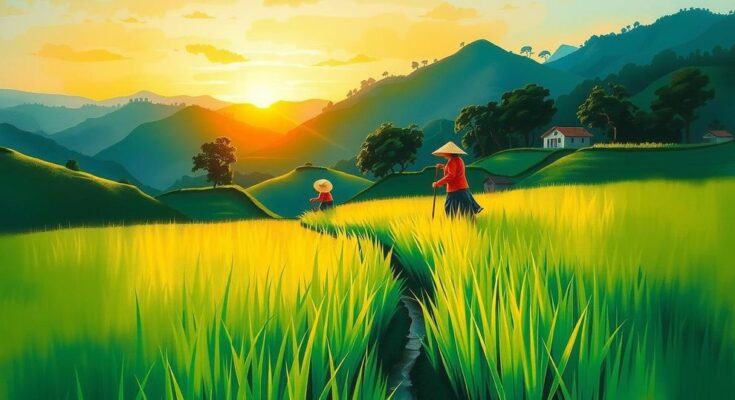Fifty years after the fall of Saigon, reflections on the Vietnam War resonate with current geopolitical tensions. Poetry emerges as a vital form of resistance against fascism, exemplified by conversations with former Oregon poet laureate Kim Stafford. The tragic statistics of war remain a testament to the long-lasting impact of conflict on both individuals and communities. Artistic expression provides solace and acts as a beacon of hope in uncertain times.
Fifty years have passed since the Fall of Saigon, a poignant reminder of the Vietnam War’s lasting impact. Reflecting on this history, a recent trip back to Vietnam evoked deep emotions, rekindling memories from the past. As a 13-year-old in 1969, I experienced the shock of learning my father had been injured by the Viet Cong while serving in Vietnam. Even as a child, I sensed the unjust nature of the American involvement in this conflict.
Arriving in Vietnam, I was struck by the contrasting beauty of the landscape dotted with rice paddies and teeming with life. It felt surreal, almost as if I had stepped into a waking dream. The sights and sounds of the country enveloped me, reminding me of how deeply Vietnam is embedded in the fabric of my own history and personal experiences.
This April marks another remembrance of the Vietnam War. However, it also reflects an unsettling ongoing trend where military action continues to be a priority for both political parties in the United States. The desire for conflict is palpable, and as I observe the political landscape today, it feels as though the rhetoric surrounding war has only intensified.
My Lai stands as a horrifying example of wartime brutality. Similarly, the current violence in Palestine reflects an escalating cycle of violence and devastation, with reports surfacing that reveal the tragic murders of civilians including journalists and medical professionals. This brutality underscores a distorted reality that surrounds modern conflict.
Interestingly, April is also National Poetry Month. As the world collectively watches the rise of fascism, poetry becomes a vital form of resistance. As modern society grapples with overwhelming challenges, the words of poets serve to illuminate the darkness that threatens to suffocate voices of peace and hope.
During a recent radio interview, I had the pleasure of speaking with former Oregon poet laureate Kim Stafford. Our conversation touched on war, political sentiment, and the profound importance of poetry. He shared a powerful piece titled “Gaza, the Sound of Rain” which offered a haunting reflection on suffering in war-torn areas. The poem underscored how art and expression remain essential in forwarding awareness during troubling times.
While in Vietnam for a biodiversity project, my role combined journalism with logistical support. Over months, I traversed the natural landscapes, documenting the unique ecosystems in peril. My return two years later put me in the position of guiding veterans through this land, facilitating their own journeys toward healing and reconciliation.
The tragic statistics of the Vietnam War loom large: millions of civilians and soldiers lost, unexploded remnants that continue to impact communities, and an entire culture deeply scarred. The devastation from herbicides and ecological warfare has left indelible marks that persist through generations. As I moved through these historical places, the painful legacy of “ecocide” came into sharp focus.
The works of poets like Yusef Komunyakaa bring this history to life. His poem “Camouflaging the Chimera” explores the haunting remnants of war and encapsulates the complexity of the human experience during conflict. The province of shadows and memories invites readers to confront the harsh realities of history.
As we confront the stark realities of our times, the importance of literary figures like Kim Stafford become apparent. His lifelong dedication to poetry and anti-war sentiment resonates now more than ever. As we navigate such despair during what he calls “dark times,” the message stands clear: art, particularly poetry, serves as a buoy in turbulent waters.
For the younger generations, taking solace in nature and the simple act of searching for beauty amidst chaos offers refuge. These moments connect them to a past shaped by those who have fought and those who continue the fight for justice through peaceful means, emphasizing that engagement in civic duty is still necessary.
Ultimately, poetry stands as a means of wielding hope against oppression. The articulated struggles of our contemporaries are woven together in verse, created in the hope that they might spark change and mitigate our collective grief.
The lasting implications of the Vietnam War, now fifty years since Saigon’s fall, continue to stir complex emotions and reflections. Political discourse around war remains fraught as society grapples with growing tensions and injustices. Poet Kim Stafford’s insights amplify the necessity for artistic expression in these trying times. As voices rise against fascism through poetry, it is clear that art remains an essential tool in navigating conflict and collective sorrow.
Original Source: www.thenewsguard.com




